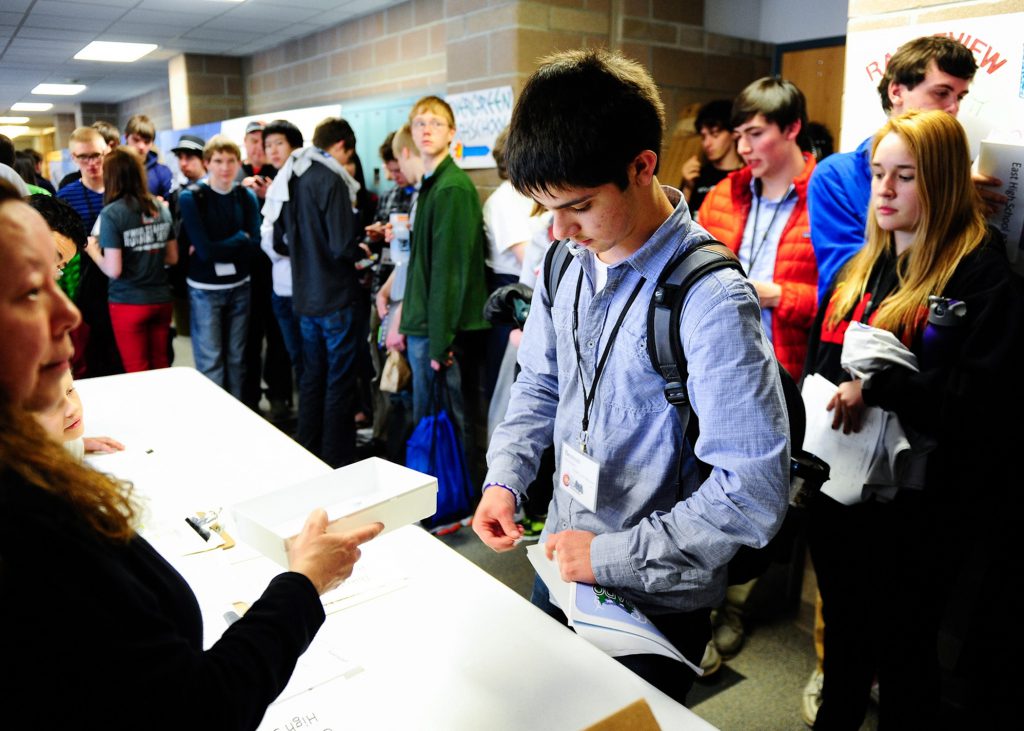
Students registering to vote in through grass roots community lead movements similar to Thomas Jefferson High School. photo courtesy of Ruben Paquin
New voter registration drive inspired civic engagement at Thomas Jefferson.
In the United States, enfranchisement plays a significant role in how citizens, especially younger generations, engage with democracy. The Colorado legislature encourages civic engagement among young people by having High School Deputy Registrars on campus who can register students 18 and older to vote in schools. While access to voting and political participation have been subject to controversy, Generation Z is set to become the largest voting generation yet. According to an NBC exit poll taken after the midterms in the U.S, “53% to 55% of registered 18-29-year-olds appear to have voted. That may be the highest ever recorded in the modern era of politics,” said Simon Rosenberg, president of New Democrat Network and the New Policy Institute.
Through the 2022 midterms, the deputy at Thomas Jefferson High School was Garien Behling, an AP US History teacher. According to a 2016 Colorado law, at least one person in a high school should be able to register students in 2016, but during COVID, many schools couldn’t comply. This year, the Thomas Jefferson administration reached out to Behling as the department head of social studies. “I thought there might be extra work involved. So I decided to take on this role, so my team didn’t have to deal with a lot of extra work,” he said.
While Behling didn’t initially realize how much work it would take, he recalls “taking an online class from one of the employees from the state employee Department,” and signing “an affidavit and swearing to uphold the Constitution.” The official registration and process of swearing on the Constitution gave him the legal power to register students to vote. Behling chuckled as he read his official title, “I’m an official Deputy Registrar for the state of Colorado and the office of the Denver Clerk Recorder.” But this fancy title allowed him to create a critical voter registration project. Behling explained his motivation behind it wasn’t just Colorado law. He described himself as a strong proponent of people participating in democracy. “We do that most effectively in our country by voting. And you can’t vote if you don’t register to vote. So I reached out to people across the school.” One of those people was student counselor Jeremy Anderson, who helped design lesson plans for getting juniors and seniors registered through Advisement.
Behling and Anderson knew they were facing a considerable challenge; getting people to vote is a massive issue in this country. During the voter registration drive where people signed themselves up, Anderson noticed that several students had opted out. “I went up to talk to a few of them and asked, ‘Why aren’t you doing it?’ They expressed a belief that their vote and their voice didn’t necessarily matter or that it wasn’t going to be heard.” To get as many students registered and excited about voting as possible, Behling tried to reach a large demographic. He “reached out to people in different spheres of influence. Jon Poole helped coordinate the Leadership class, and I tried to reach out to people for permission but also to reach out to influential people. I asked junior and seniors ‘who would you like to hear messages from in your advisement classes or on Spartan Edition to provide you instructions or inspire you to vote?’” Behling could’ve stopped there. Still, he didn’t. He continued to spread the word, coordinating with members of many different social groups at Thomas Jefferson. “I asked leadership students if they would spread the word. I asked administrators, and I asked members of the staff who are males, females, people of color. I tried to get influential people from all different demographics to encourage people to participate.”
The event’s success was also due to the collaboration of the Advisement team with Behling. Their goal, according to Anderson, was “to set something up to get our students registered.” Anderson had been setting up a lesson, but “when [Behling] came to me with this, I jumped on it because it’s something I’ve thought about in the past, and we decided just to implement that instead of whatever else I had in mind.” Behling and Anderson being able to effectively run a voter registration drive through Advisement were also important. “Because we were doing it during Advisement, it made it a little bit easier because it gave us easy access to specifically Juniors and seniors. We tried to get it to be a celebration and get everybody in one spot.”
During Advisement, students across Thomas Jefferson showed up at the event and registered to vote. Thomas Jefferson is a very diverse school, and due to Behling and Anderson’s outreach, the crowd reflected just that. Students of color, historically disenfranchised, showed up and registered to vote. When asked about the diversity of the turnout, Anderson recalled, “it would be a little naive of me to think that somehow at our school, we have it figured out when the rest of the world doesn’t. We always have work to do and could be better at it. But I also think that at the same time, hearing different perspectives and recognizing that your voice isn’t the only voice in the room is important. I think it’s just something our students understand organically because of our diversity.”